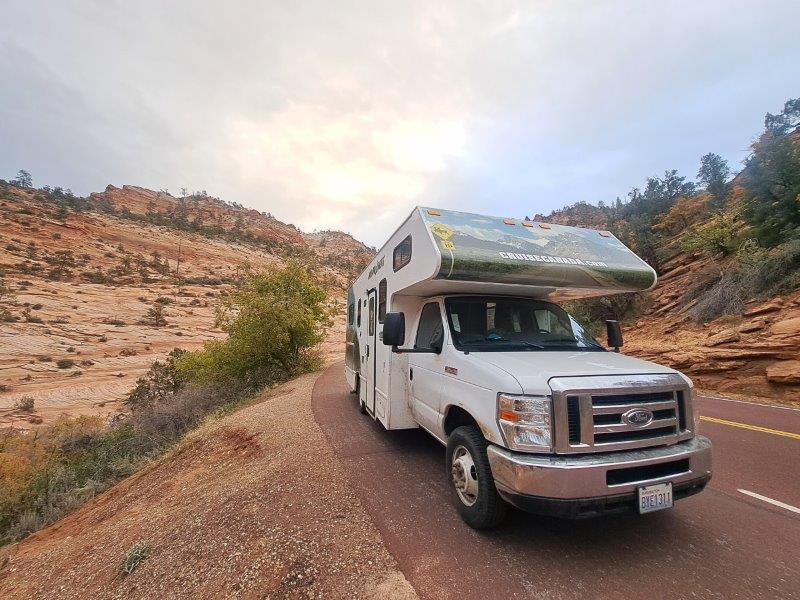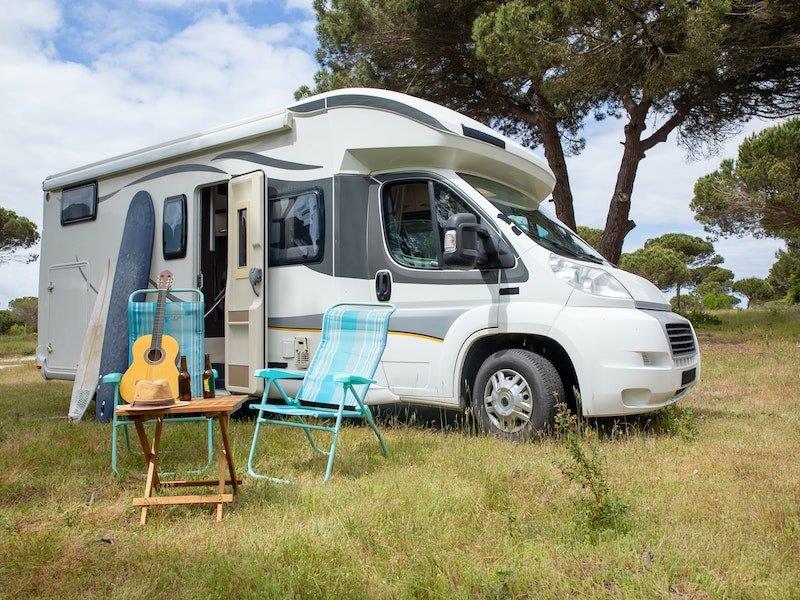From all our years of travel, we know how important it is to have a cozy and warm environment in your RV. This is especially true during those chilly nights under the stars.
That’s why we’ve put together this complete guide to help you find the perfect RV heater!
In this guide, we’ll tell you all about the various types of heaters available and walk you through what to look for when making your purchase. We’ll also share our top maintenance and safety tips so you can operate your heater in the safest way possible.

Types of RV Heaters
When it comes to heating your RV, choosing the right type of heater is the most important first step. Here are the different types of RV heaters for you to choose from depending on your needs.

Propane Heaters
Propane heaters are the most common heaters used in the RV community because of their efficiency and powerful heating capabilities. When using a propane heater, you burn propane gas to produce heat.
These heaters can be vented or non-vented, but we highly recommend the vented models for safety reasons.
Pros:
- High heat output
- Portable options available
- Quick to heat up space
Cons:
- Requires propane tanks
- Non-vented models can pose a carbon monoxide risk
- Proper ventilation is a must
Electric Heaters
Electric heaters are convenient options for RVers with access to a reliable power source. This is especially true if you use solar panels and can easily access the energy you need for these heaters!
These heaters convert electrical energy into heat using a heating element. Plus, you don’t need to carry around propane fuel all the time.
Pros:
- Safe and easy to use
- No need for fuel storage
- Many models come with built-in safety features
Cons:
- Can be a significant draw on your RV’s electrical system
- Not as effective in extremely cold conditions without a substantial power source
- Requires a consistent and reliable power supply
Diesel Heaters
Diesel heaters are great for larger RVs or colder climates. These heaters are efficient and robust little heating solutions. They burn diesel fuel to produce heat, but they typically require a proper exhaust system to vent out fumes.
If you don’t have a well-ventilated system, you may not want to opt for a diesel heater.
Pros:
- Excellent heat output
- Efficient fuel consumption
- Long-lasting and durable
Cons:
- Higher upfront cost
- Requires diesel fuel, which might not be as readily available as propane
- Installation can be more complex and may require professional help
Wood Stoves
For those who prefer a rustic and traditional heating method, wood stoves are an intriguing option. Just like a regular wood-burning stove, you’ll need to feed it firewood to keep the flame going.
These are nice, simple heaters if you have easy access to firewood during your trip. Plus, you can roast some marshmallows with them!
Pros:
- Provides a cozy and ambient atmosphere
- Renewable fuel source if you have access to firewood
- Can be used for cooking as well
Cons:
- Requires constant attention and feeding of wood
- Installation needs to meet strict safety standards
- Not as convenient as the turn-on-and-go options of other heaters
Portable Heaters
Portable heaters can be either electric or propane, and they’re great for adding extra warmth where you need it. Though they’re smaller, they often pack quite a punch for less space (and often, less money).
Pros:
- Easy to move around
- No installation required
- Can be used outside the RV as well
Cons:
- Smaller models may not provide enough heat for the entire RV
- Some models may have limited safety features
Catalytic Heaters
Catalytic heaters are a type of propane heater that burns gas at a lower temperature, producing heat through a catalytic reaction. These use fuel more efficiently so you don’t run out as quickly, keeping you warmer longer.
Pros:
- Efficient fuel consumption
- Produce heat without a flame, reducing fire risk
- Often come in portable models
Cons:
- Lower heat output compared to standard propane heaters
- Require oxygen from the air, so proper ventilation is crucial
- Some users report a smell associated with catalytic heaters
Factors to Consider When Buying an RV Heater
Choosing the right RV heater requires careful consideration of several factors. Ultimately, your goal is to get a unit that suits your needs, is safe to use, and provides the best value for your investment. Here’s a closer look at some important aspects to keep in mind when you start to shop.
Heating Capacity
When it comes to the heating capacity of RV heaters, it’s measured in British Thermal Units (BTUs). BTUs quantify the amount of heat required to raise the temperature of one pound of water by one degree Fahrenheit.
To select the perfect heater for your RV, you’ll need to calculate the BTUs necessary based on the dimensions of your space and the extent to which you wish to increase the temperature. If you have trouble with this, there are many calculators online that can help you figure this out.
It’s important to find a heater that aligns with your space size. A smaller heater may fall short on colder nights, while an excessively large one could lead to an uncomfortably hot interior and wasted energy.

Safety Features
Safety should always be a top priority. The good news is that many RV heaters come already equipped with features designed for safe operation.
Tip-over protection, for one, is a must-have feature that automatically shuts off the heater in case it tips over. This can significantly reduce the risk of a fire in the event your heater tips over.
Overheat protection is another critical safety function, which turns off the heater if it reaches an unsafe temperature. This is especially important if you plan to use your heater overnight.
For those considering propane heaters, you must choose a model with an Oxygen Depletion Sensor (ODS). This will shut off the heater if oxygen levels in the RV drop to a dangerous level.
Fuel Type and Availability
Deciding on the type of fuel for your RV heater is an important step. It’s important to consider the convenience and availability of the fuel type for your particular travel plans.
Propane is a common choice due to its wide availability, but if you plan to stay at campgrounds with electrical hookups, an electric heater might be more convenient.
Regardless of your choice, assessing the fuel efficiency of the heater is vital for cost-effective operation.
Power Consumption
For those leaning towards an electric heater, consider the electrical load it will place on your RV’s system. Though you won’t have to carry propane or other fuel, it may be too powerful for your system to handle.
Always ensure that your RV’s electrical system can handle the additional load before purchasing one, especially if you’ll be running other appliances simultaneously.
You should also be mindful of battery-operated heaters or those that require a power source for ignition or fans, as they can drain your RV’s battery.
Installation and Ventilation
Proper installation is non-negotiable when it comes to RV heaters. You absolutely must follow the manufacturer’s instructions closely.
This might mean you need professional installation, particularly for built-in or vented models. You also need adequate ventilation to prevent the buildup of harmful gases, especially when using propane heaters. Keep your RV’s layout in mind when choosing a heater.
Noise Level
Another aspect to consider is the noise level of the heater. Opt for a heater that operates quietly to maintain a peaceful environment inside your RV.
Keep in mind that heaters with fans, while effective in distributing heat, may contribute to higher noise levels. This is definitely something to consider especially if you’re a light sleeper!
Price and Warranty
Determining your budget before you start shopping is a smart strategy, and it’s important to stick to it while also considering the long-term value of the heater.
Electric space heaters are generally the most affordable options, with prices ranging from $20 to $100. They are convenient and easy to use but might not be as efficient for larger spaces.
Propane and catalytic heaters typically range in price from $50 to $300, depending on their size and heating capacity.
Diesel heaters are typically priced between $500 and $2,500, as are built-in RV furnaces.
Many RV heaters also come with a warranty. Check the warranty terms to make sure that you are covered in case of any malfunctions or issues. Be sure to pay particular attention to what parts and labor the warranty covers and for how long so you know your limits.
Additional Features
Some heaters come with additional features that can enhance convenience and comfort. A built-in thermostat, for instance, helps in maintaining a consistent temperature.
If flexibility is important to you, a portable heater that can be easily moved might be the ideal choice. Meanwhile, some models come with remote controls, allowing for easy operation without having to physically adjust the heater.
The types of additional features you go for ultimately depend on your needs, preferences, and budget. Make sure the heater you get fits all of your requirements and gives you the best experience possible.

Maintenance and Safety Tips
Maintaining your RV heater and adhering to safety guidelines is paramount to ensure a comfortable and safe living environment. Here’s more information on maintenance and safety tips to help you make the most out of your RV heater:
Regular Maintenance
Here are the top steps for regular maintenance on your RV heater:
Clean and Inspect Regularly: Dust and debris can accumulate in and around your heater, impacting its efficiency. Regular cleaning and inspection of the unit can help prevent this, ensuring optimal performance.
Check the Fuel Lines: For propane or diesel heaters, regularly check the fuel lines and connections for any signs of wear, leaks, or damage. Replace any faulty components immediately.
Check the Ventilation System: Ensure that the ventilation system is in good working condition, especially for heaters that require external venting. This is crucial to prevent the buildup of harmful gases inside the RV.
Follow Manufacturer’s Guidelines: Always refer to and follow the manufacturer’s maintenance guidelines for specific instructions related to your heater model.
Safety Practices
The absolute most important thing when it comes to installing your heater is maintaining the utmost safety standards. Here are our top recommendations for staying both warm and safe:
Install a Carbon Monoxide Detector: This is a non-negotiable safety measure for anyone using a propane or diesel heater in their RV. Ensure it is in good working order and test it regularly.
Provide Adequate Ventilation: Even with electric heaters, proper ventilation in your RV is crucial to prevent moisture buildup and ensure a supply of fresh air.
Keep Flammable Items Away: Maintain a safe distance between your heater and any flammable materials. Be aware of the heater’s surroundings and keep the area clear.
Never Leave the Heater Unattended: Avoid leaving your heater on when you are not in the RV or while sleeping, unless it is designed for safe overnight use.
Safe Operation
To operate your RV heater safely, make sure you do the following:
Follow Installation Instructions: Ensure that the heater is properly installed according to the manufacturer’s instructions. This might require professional installation for certain models.
Use the Right Fuel: If you are using a propane or diesel heater, make sure you are using the correct type of fuel and that it is clean and free from contaminants.
Educate Yourself: Take the time to thoroughly read the user manual and understand how to safely operate and maintain your heater.
Seasonal Conditions
Finally, consider these steps for seasonal maintenance of your RV heater:
Winterizing: If you won’t be using your RV during colder months, follow the manufacturer’s guidelines for winterizing your heater to prevent damage from freezing temperatures.
Annual Pre-Season Check: Before you start using your heater regularly in colder weather, perform a thorough check and maintenance routine to ensure everything is in good working order.
Final Thoughts
Investing in the right RV heater requires a blend of understanding your specific needs, considering the size of your space, and choosing a fuel type that suits your travel plans.
Remember, the best RV heater is one that not only meets your heating needs but also aligns with safety standards and is maintained with care. Take the time to research, ask questions, and read reviews to find a reliable and efficient heater that will enhance your RV adventures.
If you do, your heater will keep you warm and comfortable, no matter where the road takes you.
Review Articles on RV Heaters
If you’re on the hunt for an RV heater, check out our review guides to help you find the best one for your needs.
Overall Heaters
- Best RV Heater
- Top RV Heaters Review Compilations
- Best Heater for RV Boondocking
- Best Heater for Campervan
- Best Heater for an RV
